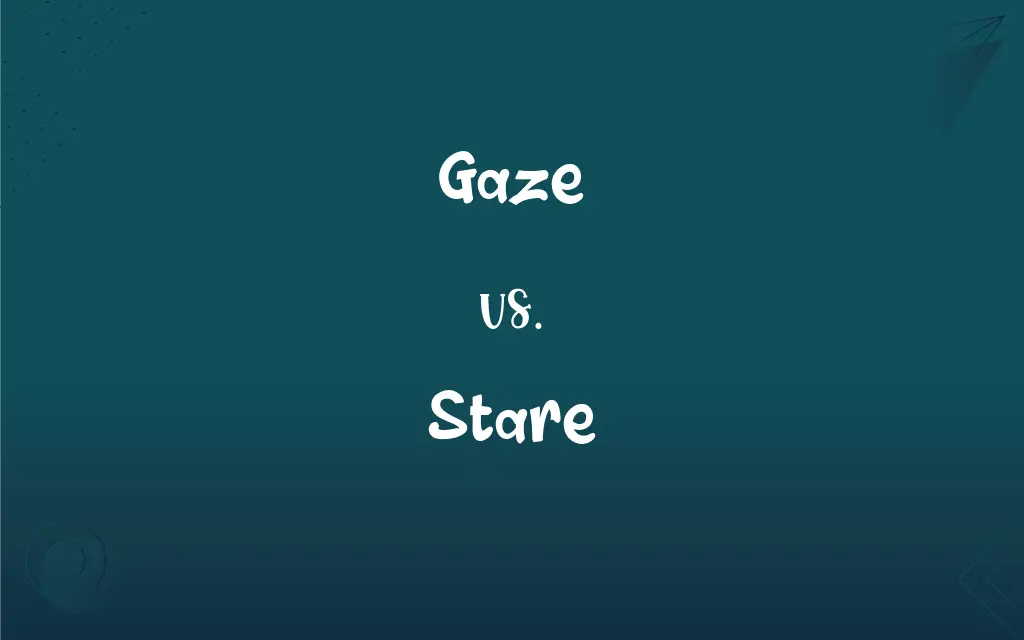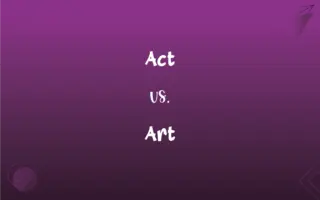Gaze vs. Stare: What's the Difference?
Edited by Harlon Moss || By Janet White || Updated on October 7, 2023
"Gaze" is a steady and intent look often reflecting deep thought or admiration, while "Stare" is a fixed or prolonged look with wide-open eyes, often implying surprise or challenge.

Key Differences
"Gaze" and "Stare" both refer to the act of looking steadily at something or someone, yet they carry distinct nuances. "Gaze" often implies a kind of intent, purposeful observation. When one gazes, there's frequently a sense of admiration, wonder, or deep contemplation attached to the act.
In contrast, to "Stare" usually conveys a more intense, sometimes even aggressive, form of looking. When people stare, it's a prolonged gaze that can often make the recipient uncomfortable. It might be due to curiosity, shock, disbelief, or even rudeness.
For example, in a romantic setting, lovers might "Gaze" into each other's eyes, suggesting warmth, affection, and connection. Whereas, if someone were to "Stare" at a stranger on a train, it might be considered intrusive or impolite.
Artists often "Gaze" at a landscape or a model, trying to capture the essence of their subject. Meanwhile, a "Stare" might be a reaction to something unexpected, startling, or challenging to understand.
Fundamentally, while both "Gaze" and "Stare" indicate sustained looking, "Gaze" leans more toward appreciation or deep thought, whereas "Stare" often leans toward surprise, scrutiny, or intensity.
ADVERTISEMENT
Comparison Chart
Nuance
Reflective, appreciative
Intense, often unsettling
Context
Often positive (e.g., romantic, contemplative)
Can be negative (e.g., rude, surprised)
Intensity
Can be soft or intense depending on context
Typically more intense
Duration
Prolonged but not necessarily intrusive
Often prolonged and can be intrusive
Example in Action
She gazed at the beautiful sunset.
He stared in disbelief at the unexpected news.
ADVERTISEMENT
Gaze and Stare Definitions
Gaze
A fixed look indicating interest
The child gazed at the magician's every move.
Stare
Look fixedly with wide-open eyes
People would stare at the rare bird in amazement.
Gaze
Intent observation reflecting contemplation
They gazed at the stars, wondering about the universe.
Stare
Observe with a sense of shock or surprise
She stared at the unexpected test results.
Gaze
Look steadily with admiration
She gazed at the painting, lost in its beauty.
Stare
Look hard and long, often in astonishment
The audience stared at the daring acrobat.
Gaze
An affectionate or tender look
The mother gazed lovingly at her newborn.
Stare
Gaze intensely, often rudely
He couldn't help but stare at the man's colorful attire.
Gaze
To look steadily, intently, and with fixed attention.
Stare
To look directly, fixedly, or vacantly, often with a wide-eyed gaze.
Gaze
A steady, fixed look.
Stare
To look at directly and fixedly
Stared him in the eyes.
Gaze
(intransitive) To stare intently or earnestly.
They gazed at the stars for hours.
Stare
An intent gaze.
Gaze
To stare at.
Stare
To look fixedly (at something).
Gaze
A fixed look; a look of eagerness, wonder, or admiration; a continued look of attention.
Stare
(transitive) To influence in some way by looking fixedly.
To stare a timid person into submission
Gaze
(archaic) The object gazed on.
Stare
(intransitive) To be very conspicuous on account of size, prominence, colour, or brilliancy.
Staring windows or colours
Gaze
(psychoanalysis) In Lacanian psychoanalysis, the relationship of the subject with the desire to look and awareness that one can be viewed.
Stare
To stand out; to project; to bristle.
Gaze
To fix the eyes in a steady and earnest look; to look with eagerness or curiosity, as in admiration, astonishment, or with studious attention.
Why stand ye gazing up into heaven?
Stare
A persistent gaze.
The stares of astonished passers-by
Gaze
To view with attention; to gaze on .
And gazed a while the ample sky.
Stare
A starling.
Gaze
A fixed look; a look of eagerness, wonder, or admiration; a continued look of attention.
With secret gazeOr open admiration him behold.
Stare
The starling.
Gaze
The object gazed on.
Made of my enemies the scorn and gaze.
I that rather held it better men should perish one by one,Than that earth should stand at gaze like Joshua's moon in Ajalon!
Stare
The act of staring; a fixed look with eyes wide open.
Gaze
A long fixed look;
He fixed his paternal gaze on me
Stare
To look with fixed eyes wide open, as through fear, wonder, surprise, impudence, etc.; to fasten an earnest and prolonged gaze on some object.
For ever upon the ground I see thee stare.
Look not big, nor stamp, nor stare, nor fret.
Gaze
Look at with fixed eyes;
The students stared at the teacher with amazement
Stare
To be very conspicuous on account of size, prominence, color, or brilliancy; as, staring windows or colors.
Gaze
Observe with deep focus
He gazed into the distance, deep in thought.
Stare
To stand out; to project; to bristle.
Makest my blood cold, and my hair to stare.
Take off all the staring straws and jags in the hive.
Stare
To look earnestly at; to gaze at.
I will stare him out of his wits.
Stare
A fixed look with eyes open wide
Stare
Look at with fixed eyes;
The students stared at the teacher with amazement
Stare
Fixate one's eyes;
The ancestor in the painting is staring down menacingly
Stare
A direct and intense gaze
His stare made her feel uncomfortable.
FAQs
Can artists Gaze at their subjects?
Yes, artists often gaze at their subjects to capture their essence, rather than stare aggressively.
Can a Gaze be intense?
Yes, while a gaze is often soft, it can also be intense, but it lacks the challenging connotation of a stare.
Can you Stare in disbelief?
Absolutely, a stare often indicates surprise or shock, whereas a gaze is more contemplative.
Can a Gaze be considered romantic?
Yes, lovers often gaze into each other's eyes, suggesting warmth and connection, unlike a stare which can be more intense.
Is it rude to Stare at strangers?
Typically, yes. A prolonged stare can be considered intrusive or impolite, unlike a gentle gaze.
Is a Stare longer than a Gaze?
Not necessarily. Both can be prolonged, but a stare is often more fixed and intense than a gaze.
Can you Gaze at the stars?
Yes, people often gaze at stars in wonderment, whereas they might stare at something surprising on Earth.
Is it unsettling to be Stared at?
Often, yes. Being the object of a stare can be uncomfortable, unlike a kinder gaze.
Does a Stare always imply disbelief?
No, while a stare can imply disbelief, it can also reflect other intense emotions or simply curiosity.
Is it common to Stare at something unusual?
Yes, unusual or unexpected sights often draw a stare from observers, unlike the more reflective gaze.
What emotion can a Stare convey?
A stare can convey various emotions like surprise, challenge, curiosity, or even aggression, unlike the often calmer gaze.
Can you Gaze out of a window dreamily?
Absolutely, gazing out of a window often implies daydreaming or deep thought, unlike the intent focus of a stare.
Can you Gaze into the future?
Metaphorically, yes. One might gaze into the future, meaning to think deeply about what's to come, rather than stare.
Can animals Gaze?
Yes, animals, especially pets, can gaze affectionately or curiously, unlike a challenging or threatening stare.
Can you Stare someone down?
Yes, to stare someone down means to look at them until they look away, often as a challenge, unlike the mutual connection of a gaze.
Is it polite to Stare at someone talking?
Continuous staring can be seen as rude or intrusive, unlike a more respectful and attentive gaze.
Is Gazing always positive?
Not always. While gazing often implies appreciation, it can also be neutral or intense, unlike the often challenging stare.
Can you Gaze at a loved one?
Definitely, a loving gaze is common among close relations, unlike a stare which might be seen as strange.
Can Gazing be a form of meditation?
Yes, some meditation practices involve gazing at an object or point, unlike the hard focus of a stare.
Can a Stare be confrontational?
Yes, a stare can be perceived as confrontational or challenging, unlike a gentler gaze.
About Author
Written by
Janet WhiteJanet White has been an esteemed writer and blogger for Difference Wiki. Holding a Master's degree in Science and Medical Journalism from the prestigious Boston University, she has consistently demonstrated her expertise and passion for her field. When she's not immersed in her work, Janet relishes her time exercising, delving into a good book, and cherishing moments with friends and family.
Edited by
Harlon MossHarlon is a seasoned quality moderator and accomplished content writer for Difference Wiki. An alumnus of the prestigious University of California, he earned his degree in Computer Science. Leveraging his academic background, Harlon brings a meticulous and informed perspective to his work, ensuring content accuracy and excellence.































































